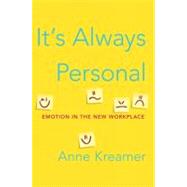
Note: Supplemental materials are not guaranteed with Rental or Used book purchases.
Purchase Benefits
What is included with this book?
| The Moment of Truth | p. 3 |
| Emotion 101 | p. 20 |
| The Anger Epidemic | p. 48 |
| On Being Afraid | p. 72 |
| Our Age of Anxiety | p. 91 |
| Empathy: We Do Get by with a Little Help from Our Friends | p. 112 |
| Big Girls Do Cry | p. 132 |
| Beyond the Facts of Life | p. 148 |
| The Four Profiles-Which One Are You? | p. 157 |
| Bouncing Back | p. 171 |
| Happy, Happy, Joy, Joy: Creativity at Work | p. 181 |
| We May Have Come from Mars and Venus, but We All Live on Earth | p. 202 |
| Acknowledgments | p. 213 |
| Bibliography | p. 215 |
| Index | p. 223 |
| Table of Contents provided by Ingram. All Rights Reserved. |
The New copy of this book will include any supplemental materials advertised. Please check the title of the book to determine if it should include any access cards, study guides, lab manuals, CDs, etc.
The Used, Rental and eBook copies of this book are not guaranteed to include any supplemental materials. Typically, only the book itself is included. This is true even if the title states it includes any access cards, study guides, lab manuals, CDs, etc.